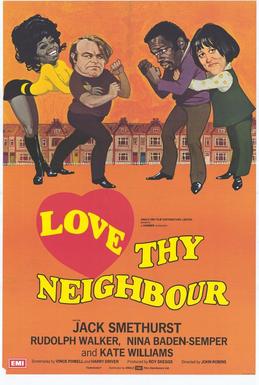Top Qs
Timeline
Chat
Perspective
Love Thy Neighbour (1973 film)
1973 British comedy film by John Robins From Wikipedia, the free encyclopedia
Remove ads
Love Thy Neighbour is a 1973 British comedy film directed by John Robins and starring Jack Smethurst, Rudolph Walker, Kate Williams and Nina Baden-Semper. It was a spin off from the television series Love Thy Neighbour (1972–76). [1]
It included the last film appearance of James Beck.
Remove ads
Plot
Eddie and Joan Booth, a white couple, live next door to Bill and Barbie Reynolds, who are black. Although Joan and Barbie are best friends, Bill and Eddie are complete opposites. Without their husbands' knowledge, Joan and Barbie enter a "Love Thy Neighbour" competition to win a cruise, but must contend with the problem of their antagonistic husbands. To add to the problems, Joan's mother-in-law is coming to stay, and Barbie's father-in-law is coming from Trinidad.
Remove ads
Cast
- Jack Smethurst as Eddie Booth
- Rudolph Walker as Bill Reynolds
- Nina Baden-Semper as Barbie Reynolds
- Kate Williams as Joan Booth
- Bill Fraser as Mr. Granger
- Charles Hyatt as Joe Reynolds
- Patricia Hayes as Annie Booth
- Melvyn Hayes as Terry
- Keith Marsh as Jacko
- Tommy Godfrey as Arthur
- Azad Ali as Winston
- Arthur English as Carter
- Andria Lawrence as Norma
- Clifford Mollison as registrar
- Lincoln Webb as Charlie
- Norman Chappell as Indian conductor
- Anna Dawson as Betty
- Bill Pertwee as postman
- Pamela Cundell as Dolly
- Annie Leake as Lil
- Damaris Hayman as woman on bus
- Siobhan Quinlan as Carol
- James Beck as Cyril
- Dan Jackson as black groom
- John Bindon as white groom
- Lesley Goldie as white bride
- Nosher Powell as bus driver
- Michael Sharvell-Martin as police constable
- Fred Griffiths as taxi driver
Remove ads
Reception
Box office
The film was popular at the box office and ranked as the 15th-most-popular of the year in the U.K.[2][3][4]
Critical
David McGillivray wrote in The Monthly Film Bulletin: "Another example of domestic farce every bit as asinine and harmless as the TV series from which it derives. The staging, pacing and vaudevillian caricatures appear to be of roughly the same vintage as the jokes."[5]
The Manchester Evening News called it "the most successful case I have seen yet of a television comedy series transferring to the big screen."[6]
Britmovie wrote: "This dated, politically incorrect tale of bigotries and one-upmanship is sprinkled with ignorant comments and insults that are frequently more laughable than offensive when viewed today."[7]
References
External links
Wikiwand - on
Seamless Wikipedia browsing. On steroids.
Remove ads

